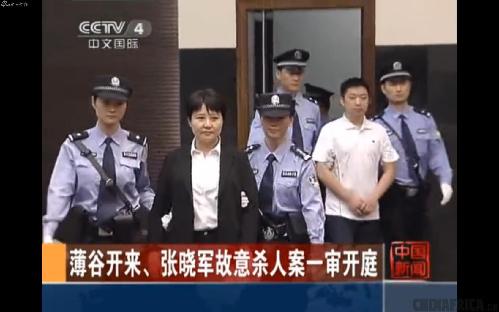|
 |
|
READY FOR TRIAL: Bogu Kailai and Zhang Xiaojun are escorted by marshals to the courtroom of the Intermediate People's Court of Hefei in east China's Anhui Province on August 9 (CCTV SCREENSHOT) |
The courtroom inside the Intermediate People's Court in Hefei, east China's Anhui Province, was packed to capacity with more than 140 people on August 9, as a closely watched murder trial began on a case that has gathered international attention because of its links to one of China's top ranked and most charismatic Communist Party of China (CPC) leaders.
The two defendants of the intentional homicide case were Bogu Kailai and Zhang Xiaojun. They were accused of murdering British businessman Neil Heywood at a hotel in Chongqing Municipality last year.
Bogu, 53, was a practicing lawyer in Beijing. She is the wife of Bo Xilai, former Party chief of southwest China's Chongqing Municipality and a former member of the Political Bureau of the CPC Central Committee.
In April, the CPC Central Committee suspended Bo from his posts at the committee and its Political Bureau because he was suspected of being involved in serious violations of discipline.
Bo is under investigation by the CPC Central Commission for Discipline Inspection.
Zhang, 22, was an employee of the General Office of the CPC Chongqing Municipal Committee.
Diplomats from the British Embassy and consulates in China, media representatives, deputies to China's legislature and members of China's political advisory body were all present at the trial.
The case
The proceedings began at 8:30 a.m.
According to the indictment, Bogu and her son, surnamed Bo, had conflicts with Heywood over economic interests. Concerned about Heywood's threat to her son's personal safety, Bogu poisoned him with the assistance of Zhang.
Bogu said in her testimony that "it was in about 2005 when my son was studying in Britain that Neil Heywood wrote us a letter introducing himself, showing his intent to get to know us."
She then testified that after she and her son became acquainted with Heywood, she brought him on to serve as a proxy to a company and participate in the planning of a land project, which never got started. Heywood later got into a dispute with the two over payment and other issues, and he threatened her son's personal safety.
In court, prosecutors presented e-mails exchanged between Heywood and Bogu, showing how the dispute between the two had escalated.
According to the evidence presented by prosecutors, after Bogu learned of the escalation of their dispute, she believed Heywood had become a threat to her son and decided to kill Heywood using poison.
"To me, it was more than a threat; it was real action that was taking place. I had to fight to my death to stop the madness of Neil Heywood," said Bogu in testimony prosecutors presented in court.
During the trial, the Ministry of Public Security's reports and position papers on the examination of material evidence, as offered by prosecutors, showed that blood extracted from Heywood's heart and samples of his vomit collected at the crime scene contained cyanide ions, showing Heywood's death was caused by cyanide poisoning. The conclusion was based on renewed examination and identification of trace evidence taken at the crime scene as well as the blood sample, which was collected and preserved by the Public Security Bureau of Chongqing after his death.
The People's Procuratorate of Hefei accused the two defendants of murder by poisoning. With clear facts and substantial evidence, their behavior violated Article 232 of the Criminal Law of the People's Republic of China; therefore, the two defendants should be held criminally responsible for intentional homicide. The case is a joint offense, with Bogu Kailai as the principal offender and Zhang Xiaojun as the accessory.
On August 20, Hefei Intermediate People's Court sentenced Bogu to suspended death and Zhang to nine years in prison.
|